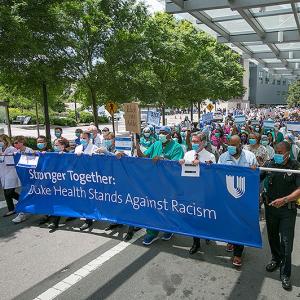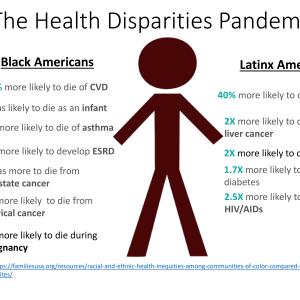Heeding the Call: Dismantling Racism
Trust in gynecology: the impact of race & socioeconomic status in women’s health
Nikki Mahendru’s mother didn’t go to the gynecologist for 45 years — and when she did, she regretted it. Ms. Mahendru felt “decades of anxieties and hesitancy reduced to five minutes of brisk interaction with her provider,” and left convinced that the “realm of women’s health was just not for her.” According to Nikki, a Duke University undergraduate, her mother’s “trust in the system was lost.”
Duke neuroscientist publishes anti-racism op-ed series
The moment has finally arrived for the United States biomedical research enterprise to directly confront structural racism in scientific funding, according to Duke neuroscientist Kafui Dzirasa, MD, PhD, K. Ranga Rama Krishnan Association Professor in the Department of Psychiatry and Behavioral Sciences.
Discrimination linked to obesity and heart disease risk in some Black women
A combination of a gene and daily-life stress contributes to disease risk in both Black and white women, but the stressors are different between the races
A genetic variation in combination with the stress of racial discrimination appears to increase the risk of metabolic and cardiovascular diseases among Black women, according to a recent study from Duke Health researchers.
Michael Boyce, PhD, to co-direct national program charged with enhancing diversity among biomedical research faculty
Michael Boyce, PhD, associate professor of biochemistry in the School of Medicine, will co-direct a national program to enhance faculty diversity at research universities, organized by the American Society for Cell Biology (ASCB) and funded by National Institutes of Health (NIH).
Getting important health information to local Latinx communities
Dr. Viviana Martinez-Bianchi has long been focused on health equity. When the coronavirus pandemic struck, she turned to the local community, helping launch an effort to get better information in the hands of area Hispanic residents.
Together with her pediatrician colleague Gabriela Maradiaga Panayotti, Martinez-Bianchi launched a campaign called Latin-19 in March to help educate North Carolina’s Latinx communities about COVID-19.
2020 Winn Awards celebrate achievements in diversity and inclusion throughout the School of Medicine
The Duke University School of Medicine has announced the 2020 recipients of the Michelle P. Winn Inclusive Excellence Award. Each year this award celebrates exceptional achievements in diversity and inclusion among our faculty, staff, trainees, and students. This year’s recipients improved inclusivity, equity, and belonging throughout the School through mentoring, advocacy, education, patient care, and other efforts, both within our walls and in our community.
Why COVID-19 is exposing health disparities
Two Duke doctors discuss reasons, possible solutions in media briefing
COVID-19 has shone a stark light on America’s economic and racial health disparities, proving there is no one-size-fits-all strategy to test and treat people for the disease, two Duke experts emphasized Thursday.
The pandemic has illuminated the struggles minority populations have in obtaining good information, getting tested and finding help when infected. But there are ways to improve the situation, the two health experts said.
In pandemic, experts offer ways to help vulnerable Hispanic communities
More resources and health protections are critical to protect Hispanic communities – many filled with essential workers – during the ongoing pandemic, three Duke health experts said Wednesday.
These resources range from simple public health education targeting their communities to paid sick leave, health insurance and the ability to distance while on the job, the health experts said during a question-and-answer panel with media.
Here are excerpts from the conversation:
‘A call to action’: Duke researchers, Durham community leaders confront COVID-19 health disparities in North Carolina
See all talks from Duke researchers and Durham community partners on the forum website.
In North Carolina, Hispanics and Blacks are contracting COVID-19 at disproportionate rates relative to their representation in the population, and Blacks are dying of COVID-19 at higher rates.









